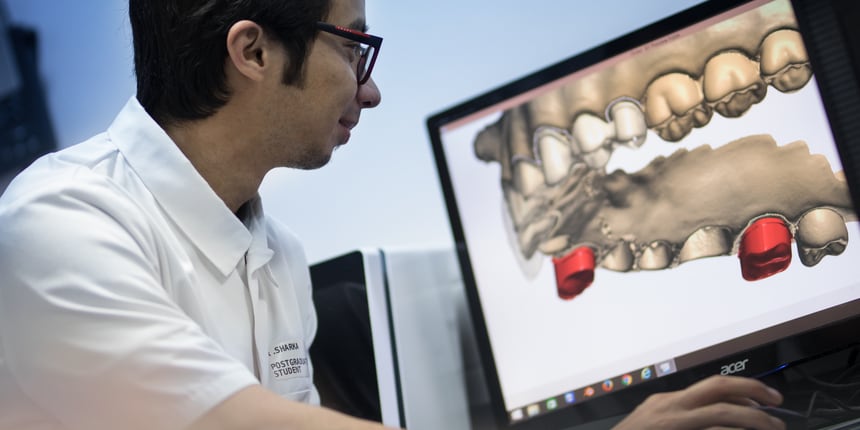Monsoon Session 2023: National Dental Commission Bill tabled in parliament
Sanjay | July 24, 2023 | 04:31 PM IST | 4 mins read
The Dental Commission Bill provides for regulation of fees in 50% seats in private dental colleges. The Dental Council of India will be replaced.

NEW DELHI: Union health minister Mansukh Mandaviya on Monday introduced ‘The National Dental Commission Bill, 2023’ in Lok Sabha. The new Bill seeks to replace the Dental Council of India with the National Dental Commission which will draft policies and maintain quality standards in dental education and the profession.
On the lines of National Medical Commission (NMC) Act 2019, the National Dental Commission Bill, 2023 has provisions of chairman and members announcing their assets publicly and National Exit Test (Dental). The new commission will also regulate fees for 50% seats in private dental colleges.
The new Bill is aiming “to regulate the profession of dentistry in the country, to provide for quality and affordable dental education, to make high quality oral healthcare accessible.” The Bill aims to bring reform in the dental education profession and its regulatory framework at par with the global standards.
“The state government shall, within one year of the commencement of this Act, take necessary steps to establish a State Dental Council,” the Bill says.
National Dental Commission: Composition
The head office of the National Dental Commission shall be at New Delhi and it will consist of a chairperson; eight ex officio members; and 24 part-time members. They will be appointed by the central government.
Members of National Medical Commission (NMC), health ministry, All India Institute of Medical Sciences (AIIMS), New Delhi will be among the eight ex-officio members. Out of 24 part-time members, a total of 19 members will be appointed on rotational basis from amongst the nominees of the states and union territories for two years.
Other five members who will be appointed for four years will include two dental faculties from any central or state or autonomous government institutes; three members who have special knowledge and professional experience in areas including management, law, medical ethics, health research, consumer or patient rights advocacy, science and technology and economics.
According to Bill, the commission’s members will declare their assets and liabilities at the time of entering and demitting office and also declare all professional and commercial engagements.
Also Read | NEET UG Counselling 2023: BDS colleges list, information bulletin out at mcc.nic.in
Dental Commission: Autonomous boards
There will be three autonomous boards of the commission:
Undergraduate and Postgraduate Dental Education Board
Dental Assessment and Rating Board
Ethics and Dental Registration Board
The Undergraduate and Postgraduate Dental Education Board will set standards and requirements for dental education and frame guidelines for institutions.
The Dental Assessment and Rating Board will determine the procedure for assessing and rating the dental institutions. It will also inspect dental colleges and make the assessment reports and ratings public. The board will also decide on the withdrawal of recognition and de-recognition of degrees.
The Ethics and Dental Registration Board will maintain an online and live national register for dentists.
The central government will appoint the president and members of the boards.
Dental Advisory Council
Under the provisions of National Dental Commission Bill 2023, the central government will constitute an advisory body – the Dental Advisory Council. The council will advise the commission and will also be the platform through which states and UTs will put forth their views. It will also advise the Commission on measures to “enhance equitable access to dental education and uniform system of examination.”
National Exit Test (Dental) and admissions
Admission to the undergraduate Bachelor of Dental Surgery (BDS) in dental institutions will be through National Eligibility-cum-Entrance Test (NEET). Till the National Exit Test (Dental) becomes operational, admissions to the postgraduate courses of Master of Dental Surgery (MDS) will be through NEET-MDS.
Through a designated agency, the commission will conduct the common counselling for all India seats and the designated authority of the state government shall conduct the common counselling for the seats at the state level.
The commission will conduct a common final year undergraduate dental examination, to be known as the 'National Exit Test (Dental)' which will be held by designated authority for granting licence to practise dentistry as dentists and for enrolment in the state register or the national register. The exit test exam will be the basis for admission to the postgraduate dental education courses in dental institutions.
“The National Exit Test (Dental) shall become operational on such date, within three years from the date of commencement of this Act, as may be appointed by the Central Government, by notification,” the Bill says.
Also Read | University of Dundee calls Indian dentists for online forensic legal odontology course
Indian students possessing a foreign dental qualification will have to qualify the National Exit Test (Dental) for the purpose of obtaining a licence to practise dentistry as a dentist in the country.
Follow us for the latest education news on colleges and universities, admission, courses, exams, research, education policies, study abroad and more..
To get in touch, write to us at news@careers360.com.